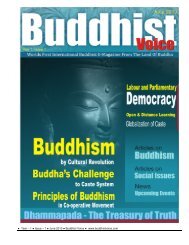BV - May 2015 Yr 2 Issue 6 E
Create successful ePaper yourself
Turn your PDF publications into a flip-book with our unique Google optimized e-Paper software.
Worship. But the Anglo-Burmese War and<br />
several foreign interventions did not allow<br />
completion of the project. In year 1890-92,<br />
Edwin Arnold, author of the Buddha<br />
Romance :The Light of Asia, appealed to the<br />
British-Indian Government to hand over the<br />
temple to the Buddhists, and even went to<br />
Japan to plead for diplomatic support to this<br />
demand. However, the court case was<br />
ultimately lost. Subsequently, the<br />
negotiations dragged on, involving Swami<br />
Vivekananda (1901) and Hindu Mahasabha<br />
leader Bhai Parmanand (1935) among<br />
others.<br />
In 1922, the Indian National Congress had<br />
appointed a committee headed by Dr<br />
Rajendra Prasad to examine the issue related<br />
to the management of the Bodh Gaya Temple,<br />
who had recommended a joint management<br />
of the Temple by both the Hindus and the<br />
Buddhists as a compromise proposal which<br />
gives both Hindus and Buddhists the right to<br />
worship and an equal representation in the<br />
management committee.<br />
After independence, in order to take care of<br />
management of Bodh Gaya Temple and its<br />
properties, the Legislature of the State of<br />
Bihar enacted the Bodh Gaya Temple Act<br />
(BGT Act), 1949, which came into force on<br />
July 6, 1949. It was just after the<br />
independence of India and Buddhism was not<br />
having significant presence in India due<br />
historical reasons. The BGT Act was amended<br />
by the Adaptation of Law Order, 1950, dated<br />
February 8, 1955. Since then, this Act has<br />
been governing the cultural, spiritual and<br />
financial affairs of one of the most sacred<br />
shrines of world without passing the<br />
Constitutional scrutiny of secularism, nondiscrimination<br />
and the fundamental right of<br />
freedom of religion.<br />
The most important governing section under<br />
BGT Act is Section 3, which empowers the<br />
State Government to constitute a ninemember<br />
temple management committee,<br />
consisting of a Chairman, and four Buddhists<br />
and four Hindus, including the Mahanth of<br />
Bodh Gaya. It imposes the condition that the<br />
Mahanth must be a Hindu. In the event that<br />
the Mahanth is unable to fulfill his duties,<br />
only another Hindu member can replace him.<br />
The act gives hereditary membership to<br />
Saivite Mahant and his successors in Bodh<br />
Gaya Temple Management Committee. It is<br />
very painful to note that the Mahabodhi<br />
Temple has been under virtual control of<br />
Hindus for centuries now.<br />
In July 2013, the Bihar Government has<br />
amended the Bodh Gaya Temple Act of 1949,<br />
allowing for a non-Hindu to head the temple<br />
committee. As per Section 3 (3) of the Act, the<br />
District Magistrate (DM) is the ex-officio<br />
chairman of the temple committee and has to<br />
be a Hindu. If the DM is a non-Hindu, the Act<br />
requires the government to nominate a Hindu<br />
as Chairman of the committee for the period<br />
during which the DM is a non-Hindu. As per<br />
the Bodh Gaya Temple (Amendment) Bill,<br />
2013, it is provided now that a Non-Hindu<br />
can be a chairman of the committee on<br />
pretext that the DM is a representative of the<br />
government’s secular credentials. Practically,<br />
it is very rare to have Buddhist DM in Bihar<br />
State and therefore Bodh Gaya Temple<br />
(Amendment) Bill, 2013, becomes just a<br />
political gimmick and does not make any<br />
change in the management of the temple. The<br />
Buddhist, over six decades, has been<br />
demanding to amend the Bodh Gaya Temple<br />
Act of 1949, allowing Buddhist to be majority<br />
on the committee so that the management of<br />
the temple can be with the Buddhist in<br />
similar lines with other shrines in the<br />
country which are managed and controlled by<br />
the members of the respective religion. A<br />
petition seeking transfer of exclusive rights to<br />
the Buddhist from the State Government has<br />
been admitted by Supreme Court in 2012,<br />
which is still pending. State Government of<br />
Bihar has always taken a stand that there is<br />
no need to alter it as long as the temple<br />
management is properly handled by the<br />
committee comprising four members each of<br />
Hindu and Buddhist communities.<br />
Of Course the Buddhist from all over the<br />
world knows that the temple is not managed<br />
as it should have been and it is of utmost<br />
importance to have complete control with the<br />
Buddhist so that it can be managed in<br />
● Year – 2 ● <strong>Issue</strong> – 6 ● <strong>May</strong> <strong>2015</strong> ● Buddhist Voice ● www.buddhistvoice.com ● Email: indian.buddhistvoice@gmail.com 4



